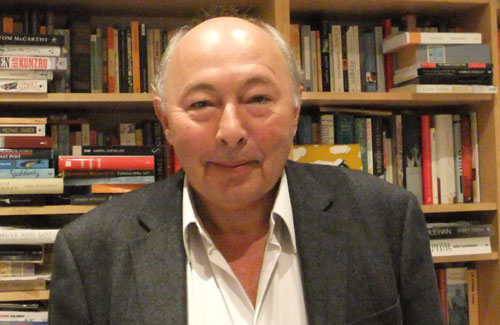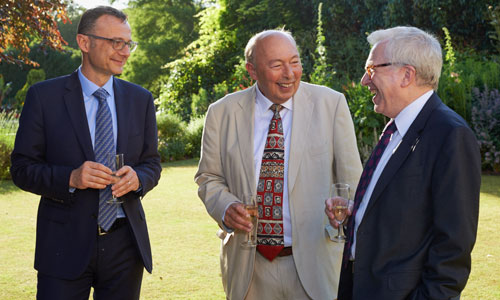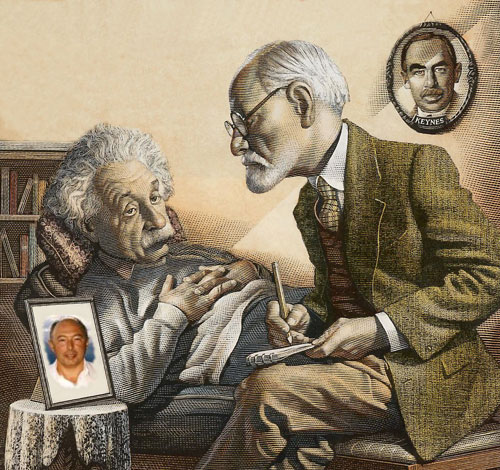Professor John Forrester (25 August 1949 – 24 November 2015)
John Forrester, Professor in the Department of History of Philosophy of Science, which he joined in 1984 and of which he served as head between 2007 and 2013, died, without pain, on the morning of 24 November 2015. His family, Lisa, Josh, Devorah, Manny, Katrina and Jamie, were with him throughout.
Make a donation to the John Forrester Memorial Award
Pre-eminent historian of psychoanalysis and of much else besides, John was a scholar and teacher of astonishing warmth and inexhaustible enthusiasm and a comrade and partner of keen intelligence and boundless curiosity. Born in London in 1949, he read Natural Sciences with Part II in History and Philosophy of Science, graduating at King's College Cambridge in 1970. He pursued graduate studies under a Fulbright Scholarship at Princeton in History of Science, publishing an early essay supervised there by T. S. Kuhn on Joule and energy conservation, before returning to Cambridge. There he delivered talks on the doctor-patient relationship to the Wellcome Unit for the History of Medicine and his first seminar at the Department of History and Philosophy of Science in 1976, a paper on psychoanalysis' boundary conditions.

In 1978 he completed his brilliant PhD thesis, examined by Frank Kermode and John Wisdom, on the wide range of roles played by linguistic sciences and philology in the development of Freud's programme. The work was soon published in revised form as the groundbreaking Language and the Origins of Psychoanalysis (1980). In the same year, he launched his long engagement with the work of Michel Foucault, whose lectures at the Collège de France he had attended in 1977-78, with a precocious essay on Foucault's relation with the history of psychoanalysis.
Between 1976 and 1984 he held research fellowships at King's, then joined the History and Philosophy of Science Department as University Lecturer, becoming Reader in 1996 and Professor in 2000. A figure of great international repute, his work has been translated into at least eight other languages. He held visiting chairs and fellowships in Brazil, France, Germany, Switzerland and the United States, and from 2005 edited the major journal Psychoanalysis and History. On the death of Peter Lipton in 2007, he became Head of Department, a role he discharged with typically charming vigour.
John's intellectual achievements are immense. In 1988, with Silvana Tomaselli, he translated and annotated Jacques-Alain Miller's decisive edition of Jacques Lacan's 1953-55 Seminar, work that set out a radical critique of ego psychology and, especially in this version, provided an unrivalled entry into the potent mix of subtle pedagogy and penetrating analysis that characterised Lacanian performances. In 1992, he and Lisa Appignanesi produced their remarkable study of Freud's Women, a magisterial and extraordinarily witty and accessible account of Freud as Lear. Now in its third edition, the book addresses fundamental questions of feminism and misogyny through the roles and experiences of Freud's patients, disciples and friends, from Marie Bonaparte and Anna Freud to Muriel Gardner and Lou Andreas-Salomé.
Many of John's own characteristic passions and projects can be followed in three major collections of his essays on the widest possible range of issues in the history and philosophy of psychoanalysis and the human sciences, astutely titled and cleverly organised: The Seductions of Psychoanalysis: Freud, Lacan and Derrida (1990); Dispatches from the Freud Wars: Psychoanalysis and its Passions (1997); and Truth Games: Lies, Money, and Psychoanalysis (1997). Every essay in these collections represents the distillation of intense thought and reflexion in ways that move far beyond any narrow disciplinary confines: on the relation between story-telling and the rhetoric of argument; on what it is to be embraced, or to be trusted, or to dream of being so; on what is at stake in making a collection, and how to cope with its threatening growth or tragic loss; on the uneven powers and strange affinities of teacher and student, therapist and patient. Each prompts speculation and argument whose full potential is doubtless yet completely to be realised.
John always saw the virtues both of solitary study and of intensely committed collaboration. He stayed admirably hostile to overweening managerial dictates that would impose inappropriate co-ordination or frustrate fruitful partnerships. None knew more of the serious arcana of regulation, clauses and paragraphs of Statutes and Ordinances seemingly memorized by heart, or found all this so evidently risible. This gave his intellectual and institutional leadership, within and far beyond his university, some of its many strengths and successes. His restorative and assured diligence often settled the nerves, and helped secure the reputation, of the group of colleagues with whom he worked and for whom he acted at a decisive and crucial period as head.
The principle that excellence should be recognised and rewarded wherever and however located drove an engaged and winning mix of policy and practice. He helped found the prestigious Cambridge Group for the History of Psychiatry, Psychoanalysis and Allied Sciences and the London Psychoanalytic Forum, organised conferences, lectures and seminar series with support from the British Psychoanalytic Society and a range of other cultural and scientific organisations, and led strong and impressive groups of colleagues and students in intense, productive and memorable debates, training sessions, classes and lectures. In London and Paris, he at once became a central figure in major projects and discussions on the place of analysis and its cultural meanings, his magnificently broad cultural command put at the service of friends and co-workers, of a host of innovative projects in publication and in film, in broadcasting and in the arts. Within the Department, as a leading member of the Wellcome Trust Strategic Award From Generation to Reproduction, John initiated fascinating studies of histories of gender reassignment and assisted reproduction in relation to the psychological disciplines since the 1950s. Many generations of undergraduates learnt first from John of the marvels of the human sciences, many of his more than two-dozen doctoral students have become, in their turn, leaders across the fields of philosophy, history and the sciences.
John was, of course, brilliant at starts and launches: hence his skill as organiser, collaborator and teacher. One of his finest essays is a 1996 meditation on thinking in cases. This would be a theme that long preoccupied his attention, evoked here through a virtuoso opening passage that moves effortlessly between a set of common passions: gardening (especially pruning), casuistry (especially reasoning on the basis of a paradigm example), and trouble-making (especially a deliberately startling subversion of anything taken for granted without adequate reflexion). John's been putting together a new collection of material on Thinking in Cases, while his current work, pursued with Laura Cameron, soon to appear in an outstanding book from Cambridge University Press, takes the logic of the case, and the accompanying entanglements and cunning reasons that accompany this kind of work, to something like its culmination. Freud in Cambridge preoccupied much of John's career in many ways: as exemplification, as series of anecdotes, as major intellectual and political projects, and as an exercise in the best kind of philosophical archaeology. Otherwise apparently stolid dons, socialites and savants of the Great War and the Jazz Age emerge here in full-colour complexity, their passions and interests documented in ways that only a scholar of John's energy and intelligence could achieve or – in some cases – stomach. Reflect on the apt words of J. D. Bernal, cited here in John's fine recent essay on the Marxist scientist's psychoanalytic passion in Cambridge back in 1921: 'he talks psychology, rhapsodies and metaphysics, and is immensely inspiring, though he instils in me the spirit of contradiction. We go out inspired, full of life and love'. And this is just the beginning.
Simon Schaffer

John Forrester with Phil Allmendinger and Martin Daunton

Poster for John Forrester's inaugural lecture, 'Freud in Cambridge' (May 2002)
